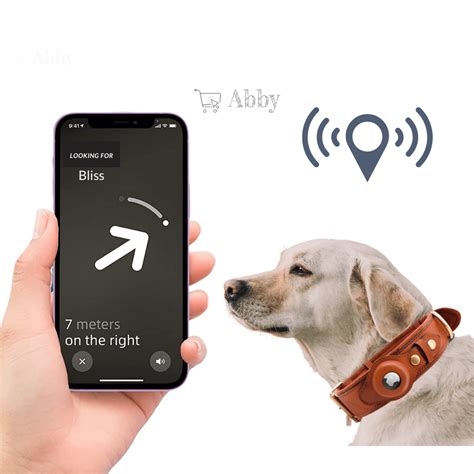Introduction
As pet owners, ensuring the well-being of our furry companions is paramount. Tracking their activities and sleep patterns can provide valuable insights into their overall health and happiness. This article will delve into the latest advancements in pet tracking technology by comparing AirTag collars and dedicated pet sleep trackers.

The Pain Points
- Lost pets: Losing a beloved pet can be devastating. AirTag collars offer real-time location tracking, allowing owners to locate their pets quickly in case of emergencies.
- Sleep deprivation for pets: Dogs and cats require adequate sleep for their physical and mental health. However, it can be difficult to monitor their sleep patterns without specialized devices.
The Motivations
- Pet safety: The ability to track a pet’s location provides peace of mind and allows owners to act swiftly if their pet wanders off.
- Pet health: Tracking sleep patterns can help owners identify potential underlying health issues and make necessary adjustments to their pet’s care routine.
AirTag Collar: Pros and Cons
Pros:
- Real-time location tracking: AirTags use Bluetooth and Apple’s Find My network to provide precise location data.
- Lightweight and comfortable: AirTag collars are designed to be worn comfortably by pets, without causing discomfort.
- Easy to use: The Apple Find My app makes it simple to track pets and view their location history.
Cons:
- Limited sleep tracking: AirTag collars do not provide dedicated sleep tracking capabilities.
- Requires Apple devices: AirTag collars are only compatible with Apple devices, which may limit their use for some pet owners.
- Battery life: AirTags have a limited battery life of approximately one year, requiring regular replacement.
Pet Sleep Trackers: Pros and Cons
Pros:
- Dedicated sleep tracking: Pet sleep trackers monitor key metrics such as sleep duration, sleep stages, and sleep quality.
- Health monitoring: Some sleep trackers also monitor vital signs, such as heart rate and breathing, providing insights into a pet’s overall health.
- Personalized recommendations: Sleep trackers can analyze data to provide personalized recommendations for improving pet sleep quality.
Cons:
- More expensive: Pet sleep trackers are generally more expensive than AirTag collars.
- May be bulky or uncomfortable: Some sleep trackers can be bulky or uncomfortable for pets to wear.
- Data sharing: Some trackers require data sharing with third parties, which may raise privacy concerns.
Comparison Table
| Feature | AirTag Collar | Pet Sleep Tracker |
|---|---|---|
| Primary function | Location tracking | Sleep tracking |
| Cost | $29 | Varies ($50-$300) |
| Battery life | 1 year | Varies (weeks to months) |
| Compatibility | Apple devices | Varies (Bluetooth or Wi-Fi) |
| Health monitoring | None | Varies (vital signs, activity) |
Which is Right for You?
The choice between an AirTag collar and a pet sleep tracker depends on your specific needs and priorities.
- If real-time location tracking is your primary concern, an AirTag collar is a reliable and cost-effective option.
- If monitoring your pet’s sleep patterns is essential, a pet sleep tracker provides more comprehensive data and insights.
Benefits of Pet Health Tracking
- Early detection of health issues: Sleep patterns can provide early warning signs of underlying health conditions, allowing for timely intervention.
- Improved sleep quality: By understanding a pet’s sleep habits, owners can make adjustments to their environment or routine to enhance sleep quality.
- Reduced stress: Adequate sleep reduces stress levels in pets, promoting overall well-being and happiness.
Pain Points of Poor Pet Health
- Cognitive decline: Sleep deprivation has been linked to cognitive decline in pets, affecting learning and memory.
- Increased risk of obesity: Pets that do not get enough sleep are more likely to become overweight or obese.
- Behavioral problems: Poor sleep can contribute to behavioral issues such as anxiety, aggression, and hyperactivity.
FAQs
1. Do AirTag collars replace pet sleep trackers?
No, AirTag collars primarily focus on location tracking, while pet sleep trackers provide specialized sleep monitoring capabilities.
2. Are pet sleep trackers safe for pets?
Reputable pet sleep trackers use non-invasive technologies that are safe for pets to wear.
3. How often should I monitor my pet’s sleep?
Regular monitoring, such as once or twice a week, can provide valuable insights into your pet’s sleep patterns and overall health.
4. What should I do if my pet’s sleep patterns change significantly?
Sudden changes in sleep patterns can indicate underlying health issues. Consult with a veterinarian for professional advice.
5. How can I improve my pet’s sleep quality?
Establish a regular sleep routine, create a comfortable sleep environment, avoid excessive stimulation before bedtime, and consider using calming aids like music or diffusers.
6. Are there any alternatives to AirTag collars and pet sleep trackers?
Emerging technologies such as GPS trackers and AI-powered sleep monitors offer alternative options for tracking pet activities and sleep patterns.
7. What new applications are being developed for pet health tracking?
Researchers are exploring the use of wearable sensors, machine learning, and cloud-based data analysis to enhance pet health monitoring and preventive care.
8. What trends are shaping the future of pet health tracking?
The trend is towards more personalized, data-driven, and holistic approaches to pet health management, empowering owners to make informed decisions about their pet’s well-being.





















